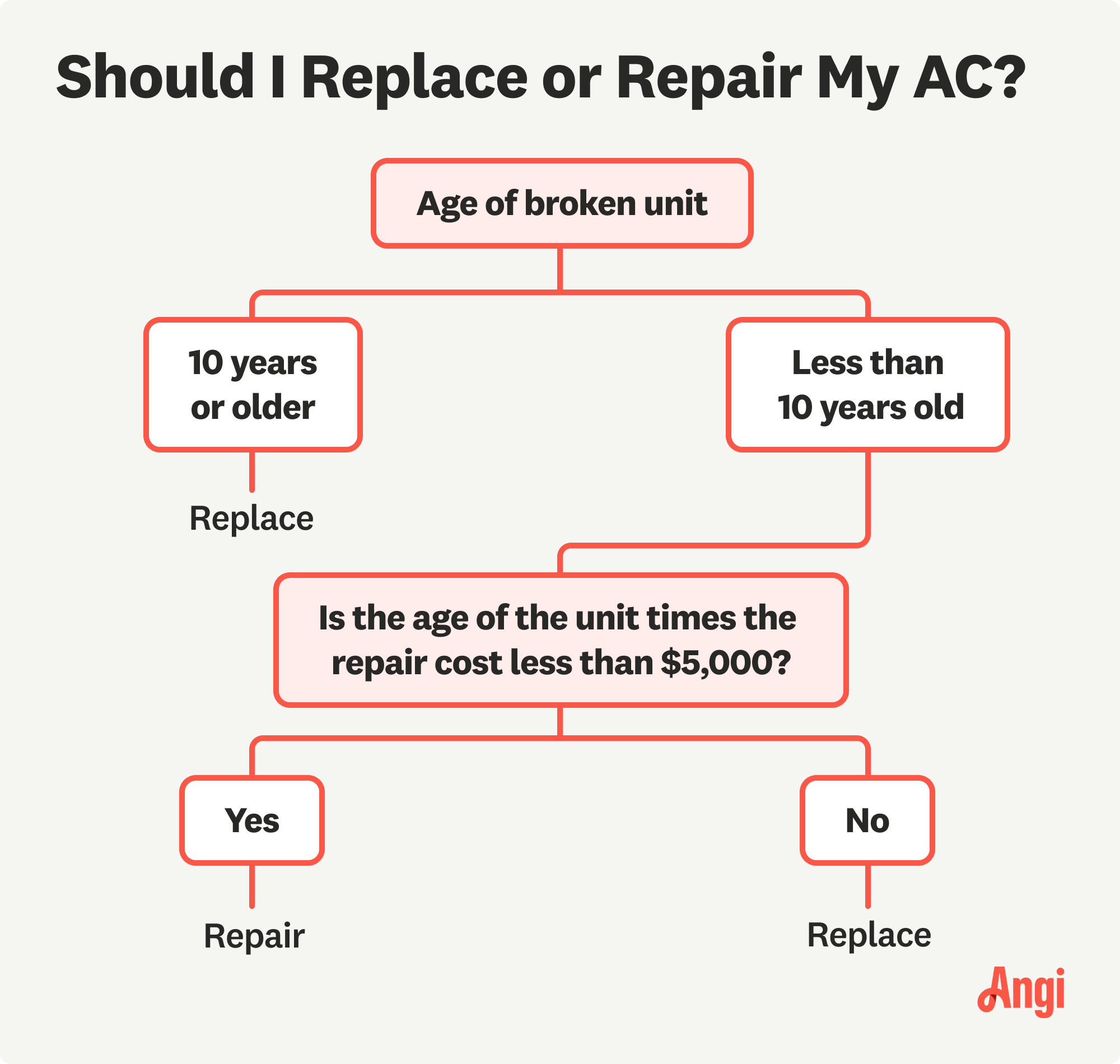
Your leaky ductwork may be hiking up your energy bills. We explore the cost of checking air ducts for leaks, which may be worth it for your home.
Keep a cool head when deciding whether to repair or replace your air conditioner


If you can fix an air conditioner without significant expense, it might be better to repair it.
Consider replacing an AC unit if it’s using dating refrigerant, raising energy bills, has an expired warranty, or is too small for your home.
The cost of a new AC unit ranges from $3,900 to $8,000, while AC repairs span between $130 and $2,000.
Hire a professional to repair or replace your AC unit.
Air conditioning replacement isn’t exactly the most cost-friendly home upgrade, and it’s a decision that shouldn’t be taken lightly. When your AC starts having issues, you’ll need to carefully consider whether you want to repair or replace the unit. Here are some key factors to consider about air conditioning replacement, including cost estimates, timeline, and whether repairs might be better.
Deciding whether to repair or replace can be difficult. With our network of local pros, you can have a specialized professional figure out the next steps.
HVACs are one of the most complicated and essential systems in our homes. To avoid further damage or safety risks, always hire a certified HVAC specialist to repair or replace broken parts.
Deciding between air conditioning replacement and repair isn’t always easy, but a few factors can help you make the right decision. Below, we’ve defined when you might repair versus replace an air conditioner. If you have more specific circumstances, consult an air conditioner installer near you.
| Repair | Replace |
|---|---|
| Repairs will cost less than $5,000 | Repairs will cost more than $5,000 |
| The system is less than ten years old | Your unit is ten years old or older |
| Your warranty covers repairs | The system always has a problem |
| You have an existing maintenance plan | You want a more efficient system (and the tax benefits of one) |
Understanding the average costs involved in air conditioner replacement or repair can help you make an informed choice. Since this project can be costly, knowing your options up front is best.
The cost of a new AC unit ranges from $3,900 to $8,000. Factors like type, size, brand, and SEER rating can affect the overall price tag. You might also have other costs to consider, like including new ductwork or an extended warranty.
The cost to repair or replace smaller components may be less than a few hundred dollars. That said, some bigger parts are considerably more expensive to replace, and complex jobs are also more labor-intensive. Here are some examples:
| AC Repair Type | Average Cost Range |
|---|---|
| Compressor | $800–$2,800 |
| Fan motor | $100–$700 |
| Circuit board | $200–$600 |
| Thermostatic expansion valve | $350–$450 |
| AC leak | $200–$1,600 |
| Evaporator coil | $600–$2,000 |
| Refrigerant recharge | $200–$500 |
Especially with an older system, some repairs may have you considering whether a complete AC unit replacement would be more beneficial than replacing each part.
Sometimes, it’s simply not cost-effective to repair your air conditioner unit, and a full replacement is a smarter investment. Look out for these signs that you should consider replacing your unit, and call a local air conditioning installer for the job.
Many air conditioning units over ten years old use R-22 refrigerant. As of 2020, it’s no longer possible to produce this legally in the U.S. Consequently, any remaining supplies cost considerably more than the readily available R-410A refrigerant used in modern units. Not only will this make refrigerant repairs more expensive and potentially challenging, but the product can also contribute to the depletion of the ozone layer in our atmosphere. If you have an older AC unit that uses dated refrigerant, replacing it might be best (and more cost-effective).

All air conditioning units have an SEER (Seasonal Energy Efficiency Ratio) rating or SEER2 rating to measure their energy efficiency; a higher number indicates greater efficiency. The U.S. Department of Energy has increased the minimum efficiency standards over the years. Regardless of how well you maintain an older AC unit, it will always be less efficient than a modern system.
Beyond age and SEER ratings, an improperly sized unit, an incorrect amount of refrigerant, or worn electrical parts can all negatively impact energy efficiency. If you see your energy bills creeping up, purchasing a new and more efficient unit could be a worthwhile long-term investment.
Indoor and outdoor AC units should operate as a set, working together to heat and cool your home. The interior components of each unit need to be compatible to operate efficiently. A mismatched system will not run as smoothly and is more likely to break down.
If you continually experience issues caused by your mismatched system, it’s worth upgrading one or both units so they can work together.
While replacing your AC unit is an investment, several incentives can make it worth your while. For example, you can receive a federal tax credit for switching to a more advanced and energy-efficient model. You can also research rebates available in your state or municipality that can reduce the overall cost of replacing your outdated AC unit.
If you’re having your home redecorated, you might decide that an old, rusty-looking unit is too much of an eyesore to keep, regardless of how well it operates. When considering what might work best for your new decor upgrade, you can choose between many types of air conditioners.
In a perfect world, your air conditioner should last its entire lifespan without any problems. But in reality, parts can break or wear over time. A manufacturer’s warranty can protect your wallet from unexpected early costs. This is a written assurance that the manufacturer will repair or replace defective components within the warranty period.
Remember that for your warranty to remain valid, you must follow the terms and conditions listed in the contract. These might include professional installation, annual maintenance, and registering the unit. If the warranty on a major part has expired, it might be more cost-effective to replace the unit rather than pay for a costly repair.
As with most appliances, certain advances in technology happen over the years. If your AC unit is older and starting to wear out, replacing the unit might be the better option. New changes to the speed, thermostat, and energy efficiency can make newer AC units more cost-effective and convenient to use.
Not every air conditioner is created equally—some are bigger and more powerful, while others are perfect for cooling smaller spaces. Knowing what size air conditioner you need is important for maintaining whole-home comfort.
If your air conditioner is too small for your home, it will have to run for extended periods to keep up with the demand, which will shorten its lifespan. Consider replacing your small unit with one that is up to the task.
Replacing an AC unit is a complex job that’s not suitable for DIY. It requires advanced training, technical skill, and certification by the Environmental Protection Agency (EPA) to handle refrigerants. Many areas also require permits for HVAC system installations. For safety, code compliance, and warranty protection, it’s best to hire a local air conditioning installation pro to do the work for you.
A quality and efficient air conditioner is a big investment. If you can fix the problem without significant expense, a repair might be a better option than a replacement. Here are some situations when you might consider repairing an air conditioner.
Many HVAC system pros use the “$5,000 rule” when deciding if a repair makes more sense in the long run. Here, you multiply the age of the unit by the repair cost, and if the total is less than $5,000, you should consider repairing it. If it exceeds $5,000, it might be better to replace it.

If you have a relatively new AC unit, replacing it rarely makes financial sense unless the cost of repairs runs into the thousands. To spare your wallet, talk to a local AC repair pro to determine why your newer AC already needs repair—sometimes, it's as simple as a faulty part that might be covered under warranty.
If you’ve had your AC for less than a few years and are only experiencing a one-off breakdown, it’s most likely not a sign that you will need to replace your unit. However, if you’ve had the same unit for over a few years and are experiencing month after month of unexpected breakdowns, you might consult an air conditioner installer near you for a more reliable replacement unit.
Below are several common signs that your AC isn’t working properly. If you experience one or more of these issues, consult your local air conditioning installer to help diagnose the source of the problem.
Excessive or increasing noise from your AC or vibrations (squealing, grinding, or grating are common culprits)
An increase in your home’s humidity levels
Frequent breakdowns
A significant increase in your energy bills
Water or refrigerant leaks
Hot air blows out of the unit
The unit doesn’t switch off or won’t turn on
Poor airflow resulting in the unit cooling areas of the home unevenly
Burning smells or moldy odors emanating from the unit
Excessive dust accumulation in your home
From average costs to expert advice, get all the answers you need to get your job done.

Your leaky ductwork may be hiking up your energy bills. We explore the cost of checking air ducts for leaks, which may be worth it for your home.

Whole-house humidifier costs vary based on the type and size of the unit, along with other factors. The price might be worth it for people living in dry regions.

Exposed ductwork can be a smart choice even beyond aesthetics. Fortunately, exposed ductwork costs are relatively low, and easy access keeps repair costs to a minimum.

There are a few different types of refrigerant for AC systems, but some contain environmental hazards. Learn about the five main types of refrigerant.

Keep your home perfectly cool during the warm months. Learn about nine types of air conditioners and how to choose the right one for your home.

Thinking about installing a heat pump in your home? Learn about the different types of heat pumps and the options you can choose from in this guide.